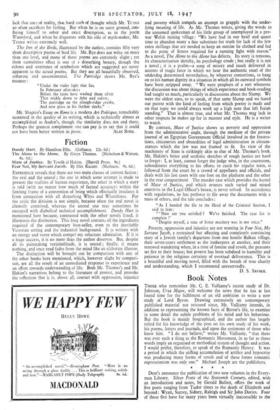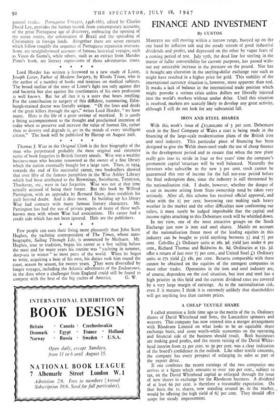Book Notes
THOSE who remember Mr. C. E. Vulliamy's recent study of Dr. Johnson, Ursa Major, will welcome the news that he has at last found time for the fulfilment of an old ambition to write a new study of Lord Byron. Drawing extensively on contemporary published material not reissued since, Mr. Vulliamy intends, in addition to representing the known facts of Byron's life, to examine in some detail the subtle problems of his mind and his behaviour. But the book is mainly biographical, and the author has largely relied for his knowledge of the poet on his own study of his work, his poems, letters and journals, and upon the testimony of those who knew him. " I do not believe," writes Mr. Vulliamy, " that there was ever such a thing as the Romantic Movement, in so far as those words imply an organised or methodical system of thought and action. I would prefer, therefore, to speak of the Romantic Heresy. It was a period in which the stifling accumulation of artifice and hypocrisy was producing many forms of revolt and of these forms romantic expressionism was only one." Michael Joseph are the publishers.
* * * *
Dent's announce the publication of two new volumes in the Every- man Library. Silver Poets of the Sixteenth Century, edited, with an introduction and notes, by Gerald Bullett, offers the work of five poets ranging from Tudor times to the death of Elizabeth and beyond: Wyatt, Surrey, Sidney, Raleigh and Sir John Davies. Four of these five have for many years been virtually inaccessible to the general reader. Portuguese Voyages, 1498-1663, edited by Charles David Ley, provides the human record, from contemporary accounts, of the great Portuguese age of discovery, embracing the opening of the ocean routes, the colonisation of Brazil and the spreading of Christianity in foreign lands. Altogether there are seven extracts which follow roughly the sequence of Portuguese expansion overseas. Some are straightforward accounts of famous historical voyages, such as Vasco da Gama's, while others, such as an extract from Mendes Pinto's book, are literary expressions of those adventurous times.
Lord Horder has written a foreword to a new study of Lister, Joseph Lister, Father of Modern Surgery, by Rhoda Truax, who is the author of a number of books and treatises on medical subjects. The broad outline of the story of Lister's fight not only against dirt and bacteria but also against the reactionaries of his own profession is well known. But for all that it is a story that bears retelling. For the contribution to surgery of this diffident, stammering, Edin- burgh-trained doctor was literally unique. " Of the lives and deeds of the great killers through the ages," writes Lord Horder, " we have many. Here is the life of a great saviour of mankind. It is surely a fitting accompaniment to the thought and proclaimed intention of today when to preserve and increase the value of human life, rather than to destroy and degrade it, are in the minds of every intelligent citizen." The book will be published by Harrap on August loth.
* * * * Thomas 7. Wise in the Original Cloth is the first biography of the man who perpetrated probably the most original and extensive series of book forgeries in British literary annals. Wise was a wealthy business-man who became renowned as the owner of a fine library which the nation eventually bought for a large sum. Then, in 1934, towards the end of his successful career, two booksellers showed that over fifty of the famous pamphlets in the Wise Ashley Library which had been attributed to the Brownings, Swinburne, Tennyson, Thackeray, etc., were in fact forgeries. Wise was not at that time actually accused of being their forger. But this book by Wilfred Partington, with an appendix by Bernard Shaw, does establish his guilt beyond doubt. And it does more. In building up his library Wise had contacts with many famous literary characters. Mr. Partington has had the use of private papers of many of these well-
known men with has Wise had associations. His career had a credit side which has not been ignored. Hale are the publishers.
* * * * Few people can earn their living more pleasantly than John Scott Hughes, the yachting correspondent of The Times, whose auto- biography, Sailing Through Life, is announced by Methuen. Mr. Hughes, true to tradition, began his career as a boy sailing before the mast and for many years his routine was " yachting in summer, deep-sea in winter " to most parts of the world. When he began to write, acquiring a boat of his own, his duties took him round the coast, season by season, for twenty years. Whey were diversified by longer voyages, including the Atlantic adventures of the Endeavours, in the days when a challenger from England could still be found to
compete with the best of the big yachts of America. G. W.



































 Previous page
Previous page